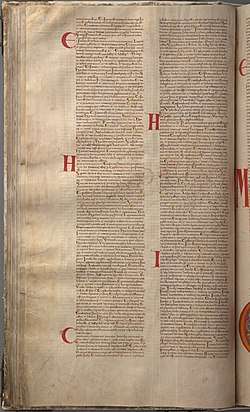Zechariah 10
| Zechariah 10 | |
|---|---|
 | |
| Book | Book of Zechariah |
| Bible part | Old Testament |
| Order in the Bible part | 38 |
| Category | Nevi'im |
Zechariah 10 is the tenth chapter of the Book of Zechariah in the Hebrew Bible or the Old Testament of the Christian Bible.[1][2] This book contains the prophecies spoken by the prophet Zechariah, and is a part of the Book of the Twelve Minor Prophets.[3][4]
Text
- The original text is written in Hebrew language.
- This chapter is divided into 12 verses.
- Continuation of the subject in the seventh chapter.[5]
Textual versions
Some most ancient manuscripts containing this chapter in Hebrew language:
- Masoretic Text (10th century)
- Dead Sea Scrolls: (2nd century BC)[6][7]
- 4Q82 (4QXIIg): extant: verses 11-12[6]
Ancient translations in Koine Greek:
- Septuagint (3rd century BC)
- Theodotion version (~AD 180)
Structure
NKJV groups this chapter into:
- Zechariah 10:1-12 = Restoration of Judah and Israel
Verse 2
- For the idols have spoken vanity,
- and the diviners have seen a lie,
- and have told false dreams;
- they comfort in vain:
- therefore they went their way as a flock, they were troubled,
- because there was no shepherd.[8]
- " Idols": "teraphim". They seem to have been images of human form and sometimes of life size, corresponding in some degree to the lares or penates of the Romans (Genesis 31:19; 1 Samuel 19:13). They were supposed to be capable of bestowing temporal blessings and giving oracles (Judges 17:5; Judges 18:5, 24; Ezekiel 21:21).[9] They are united with the "ephod," as forbidden, over against the allowed, means of enquiry as to the future, in Hosea, "without an ephod and without teraphim" Hosea 3:4; they were united in the mingled worship of Micah Judges 17:5; Judges 18:14, Judges 18:17-18, Judges 18:20; Josiah "put" them "away" together with the "workers with familiar spirits and the wizards" 2 Kings 23:24, to which are added, "the idols." It was probably, a superstition of Eastern origin. Rachel brought them with her from her father's house, and Nebuchadnezzar used them for divination. Ezekiel 21:21. Samuel speaks of them, apparently, as things which Saul himself condemned. "Rebellion is as the sin of divination, and stubbornness as iniquity or idolatry, and teraphim" 1 Samuel 15:23. For it was probably in those his better days, that "Saul had put away those that had familiar spirits and wizards out of the land" 1 Samuel 28:3. Samuel then seems to tell him, that the sins to which he clave were as evil as those which he had, in an outward zeal, like Jehu, condemned. Anyhow, the "teraphim" stand united with the "divination" which was expressly condemned by the law Deuteronomy 18:13-14. The use of the teraphim by Rachel Genesis 31:19, Genesis 31:34-35 and Michal 1 Samuel 19:13, 1 Samuel 19:16 (for whatever purpose) implies that it was some less offensive form of false worship, though they were probably the "strange gods" Genesis 35:2, Genesis 35:4 which Jacob bade his household to put away, or, anyhow, among them, since Laban calls them, "my gods" Genesis 31:30, Genesis 31:32.[10]
- "And the diviners have seen a lie": delivered it out, and others believed it, being given up to judicial blindness, because they received not the love of the truth, 2 Thessalonians 2:10. The Targum is, "the diviners prophesy falsehood."[11]
- "Have told false dreams": Vulgate, somniatores locuti sunt frustra; LXX., τὰ ἐνύπνια ψευδῆ ἐλάλουν, "spake false dreams." The Vulgate seems to be correct, "dreams, i.e. dreamers, spake deceit." This is the third class among the practisers of superstitious observances. They comfort in vain, when they promise temporal blessings (Job 21:34). Three kinds of superstition are mentioned. Septuagint, οἱ ἀποφθεγγόμενοι, "speaking" images. These are the first class. Second class are the soothsayers, the diviners, persons who pretended to predict the future.[9]
- "Comfort in vain": literally, "give vapor for comfort"; that is, give comforting promises to consulters which are sure to come to naught (Job 13:4; 16:2; 21:34).[5]
- "Because there was (is) no shepherd": Because they had no king to guard and lead them, they fell under the power of foreign rulers, who ill treated and oppressed them (Ezekiel 34:5; Nehemiah 5:15).[9]
See also
- Related Bible parts: Psalm 118, Ezekiel 36, Ezekiel 37
Notes and references
- ↑ Collins 2014.
- ↑ Hayes 2015.
- ↑ Metzger, Bruce M., et al. The Oxford Companion to the Bible. New York: Oxford University Press, 1993.
- ↑ Keck, Leander E. 1996. The New Interpreter's Bible: Volume: VII. Nashville: Abingdon.
- 1 2 Robert Jamieson, Andrew Robert Fausset; David Brown. Jamieson, Fausset, and Brown's Commentary On the Whole Bible. 1871.

- 1 2 Dead sea scrolls - Zechariah
- ↑ Timothy A. J. Jull; Douglas J. Donahue; Magen Broshi; Emanuel Tov (1995). "Radiocarbon Dating of Scrolls and Linen Fragments from the Judean Desert". Radiocarbon. 38 (1): 14. Retrieved 26 November 2014.
- ↑ Zechariah 10:2
- 1 2 3 Joseph S. Exell; Henry Donald Maurice Spence-Jones (Editors). The Pulpit Commentary. 23 volumes. First publication: 1890.

- ↑ Barnes, Albert. Notes on the Old Testament. London, Blackie & Son, 1884. Reprint, Grand Rapids: Baker Books, 1998.

- ↑ John Gill. John Gill's Exposition of the Entire Bible. Exposition of the Old and New Testament. Published in 1746-1763.

Bibliography
- Collins, John J. (2014). Introduction to the Hebrew Scriptures. Fortress Press.
- Hayes, Christine (2015). Introduction to the Bible. Yale University Press.
External links
Jewish
Christian
This article is issued from
Wikipedia.
The text is licensed under Creative Commons - Attribution - Sharealike.
Additional terms may apply for the media files.